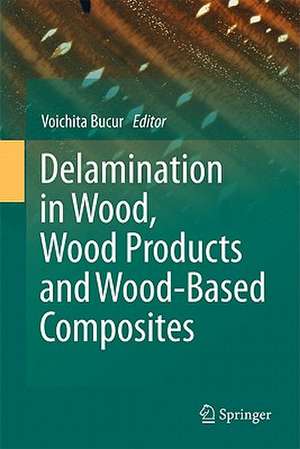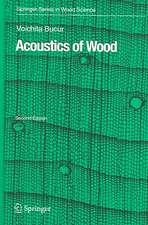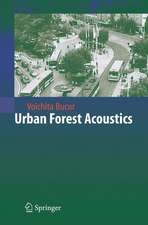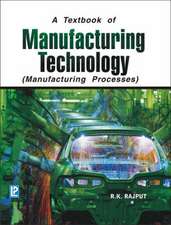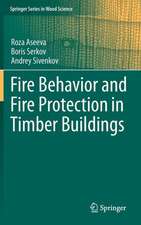Delamination in Wood, Wood Products and Wood-Based Composites
Editat de Voichita Bucuren Limba Engleză Hardback – 4 noi 2010
| Toate formatele și edițiile | Preț | Express |
|---|---|---|
| Paperback (1) | 1222.49 lei 6-8 săpt. | |
| SPRINGER NETHERLANDS – 13 noi 2014 | 1222.49 lei 6-8 săpt. | |
| Hardback (1) | 1229.10 lei 6-8 săpt. | |
| SPRINGER NETHERLANDS – 4 noi 2010 | 1229.10 lei 6-8 săpt. |
Preț: 1229.10 lei
Preț vechi: 1498.90 lei
-18% Nou
Puncte Express: 1844
Preț estimativ în valută:
235.18€ • 246.21$ • 194.60£
235.18€ • 246.21$ • 194.60£
Carte tipărită la comandă
Livrare economică 05-19 aprilie
Preluare comenzi: 021 569.72.76
Specificații
ISBN-13: 9789048195497
ISBN-10: 9048195497
Pagini: 416
Ilustrații: XIV, 401 p.
Dimensiuni: 155 x 235 x 31 mm
Greutate: 0.77 kg
Ediția:2011
Editura: SPRINGER NETHERLANDS
Colecția Springer
Locul publicării:Dordrecht, Netherlands
ISBN-10: 9048195497
Pagini: 416
Ilustrații: XIV, 401 p.
Dimensiuni: 155 x 235 x 31 mm
Greutate: 0.77 kg
Ediția:2011
Editura: SPRINGER NETHERLANDS
Colecția Springer
Locul publicării:Dordrecht, Netherlands
Public țintă
ResearchCuprins
1. Introduction.- 2. Terms for delamination in wood science and technology.- 3. Delamination evaluation - a vibration-based approach.- 4. Crack initiation and growth of delamination in wood and wood-based composites a Fracture Mechanics approach.- 5. A theoretical model of collapse recovery.- 6. Delamination of wood at the microscopic scale: current knowledge and methods.- 7. Probing the wood coating interface at high resolution.- 8. Delamination in timber induced by microwave energy- 9. Delamination in wood and wood products induced by weathering.- 10. Delamination in timber induced by drying.-11. Industry prospective of delamination in wood and wood products.-12. Internal checking during Eucalypt processing.-13. Acoustic tomography for tension wood detection in eucalypts.- 14. Modeling of hygroscopic warping of laminated wood panels.- 15. Acoustic emission activity induced by delamination and fracture of wood.- 16. Delamination detection in wood-based composite panels products using ultrasonics.- 17. Evaluation of in-service glulam beams by an acoustic technique.- 18. Moisture induced stresses and deformations in parquet floors.- 19. Nondestructive glue line assessment in timber laminates with an air-coupled ultrasonic technique.- 20. From present researches to future developments.- 21. Subject Index.-
Textul de pe ultima copertă
In the last quarter century, delamination has come to mean more than just a failure in adhesion between layers of bonded composite plies that might affect their load-bearing capacity. Ever-increasing computer power has meant that we can now detect and analyze delamination between, for example, cell walls in solid wood. This fast-moving and critically important field of study is covered in a book that provides everyone from manufacturers to research scientists the state of the art in wood delamination studies.Divided into three sections, the book first details the general aspects of the subject, from basic information including terminology, to the theoretical basis for the evaluation of delamination. A settled terminology in this subject area is a first key goal of the book, as the terms which describe delamination in wood and wood-based composites are numerous and often confusing. The second section examines different and highly specialized methods for delamination detection such as confocal laser scanning microscopy, light microscopy, scanning electron microscopy and ultrasonics. Ways in which NDE (non-destructive evaluation) can be employed to detect and locate defects are also covered. The book’s final section focuses on the practical aspects of this defect in a wide range of wood products covering the spectrum from trees, logs, laminated panels and glued laminated timbers to parquet floors. Intended as a primary reference, this book covers everything from the microscopic, anatomical level of delamination within solid wood sections to an examination of the interface of wood and its surface coatings. It provides readers with the perspective of industry as well as laboratory and is thus a highly practical sourcebook for wood engineers working in manufacturing as well as a comprehensively referenced text for materials scientists wrestling with the theory underlying the subject.
Caracteristici
First book devoted to delamination Single source for understanding delamination in wood-based materials from microstructural mechanism to industrial application Demonstrates how NDE (non-destructive evaluation) can be employed to detect and locate defects Expert authors possess a broad spread of expertise in delamination No other book deals with delamination over a wide range of scales and wood-based materials
